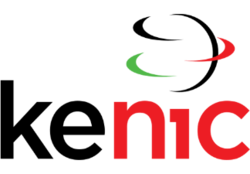KeNIC: Difference between revisions
No edit summary |
Christiane (talk | contribs) Content moved to another page |
||
| (One intermediate revision by the same user not shown) | |||
| Line 22: | Line 22: | ||
==History== | ==History== | ||
The .ke domain was originally delegated in 1993 by Jon Postel to Dr. Shem Ochuodho and Randy Bush. By 2001, Kenyan stakeholders formed the Kenya Network Information Centre (KeNIC) to take over the management of the .ke domain. In June 2002, KeNIC requested redelegation of the domain from IANA, with support from the Communications Commission of Kenya (CCK) and local Internet stakeholders. However, Dr. Ochuodho objected and failed to cooperate with IANA’s requests for resolution. | |||
At an ICANN meeting in August 2002, Dr. Ochuodho agreed to resolve the issue within 30 days but did not follow through. Due to this lack of consensus, IANA made a unilateral decision to approve the redelegation in December 2002.<ref name="iana">[https://www.iana.org/reports/2002/ke-report-20dec02.html IANA Redelegation Report - .ke]</ref> <ref>[http://archive.icann.org/en/policies/icp-1-archived.htm ICANN Internet Coordination Policy 1 - Internet Domain Name System Structure and Delegation (ccTLD Administration and Delegation)]</ref> | |||
== Membership == | == Membership == | ||
| Line 44: | Line 44: | ||
* Kenya Internet Marketing Association (KIMA) | * Kenya Internet Marketing Association (KIMA) | ||
== Roles of | == Roles of KeNIC == | ||
KeNIC was established with the vision of bringing the Kenyan Internet technology up to global standards and to promote Internet and its services in the country on a large scale. KeNIC has the following functions: | |||
* To develop and promote .ke ccTLD. | * To develop and promote .ke ccTLD. | ||
* To create a technological infrastructure for the efficient administration of the .ke ccTLD. | * To create a technological infrastructure for the efficient administration of the .ke ccTLD. | ||
| Line 56: | Line 57: | ||
* Abide with all global ICANN Internet policies. | * Abide with all global ICANN Internet policies. | ||
* Assist ICANN in its development.<ref>[http://www.kenic.or.ke/index.php?option=com_content&task=view&id=13&Itemid=38 Functions of KENIC]</ref> | * Assist ICANN in its development.<ref>[http://www.kenic.or.ke/index.php?option=com_content&task=view&id=13&Itemid=38 Functions of KENIC]</ref> | ||
== References == | == References == | ||
Latest revision as of 21:13, 23 October 2024
 | |
| General Information | |
|---|---|
| Industry: | Registry |
| Country: | Kenya |
| Headquarters: | Waiyaki Way, Nairobi |
| Website: | http://www.kenic.or.ke |
| Email: | admin [at] kenic.or.ke |
| Facebook: | |
| Twitter: | [@KenicTLD Twitter] |
| People | |
|---|---|
| Founder(s): | Dr. Shem Ochuodho and Mr. Randy Bush |
Kenya Network Information Centre (KeNIC) is the registry operator for Kenya's .ke ccTLD.[1] It also aims at the development of Internet and other Internet related services in Kenya, with the assistance of various national and international organizations through cooperative agreements, as well as public-private partnerships (PPPs).[2] In addition to these main objectives, KeNIC aims to bring Kenya on equal standards with the global Internet technology with the assistance of the government.[3]
History[edit | edit source]
The .ke domain was originally delegated in 1993 by Jon Postel to Dr. Shem Ochuodho and Randy Bush. By 2001, Kenyan stakeholders formed the Kenya Network Information Centre (KeNIC) to take over the management of the .ke domain. In June 2002, KeNIC requested redelegation of the domain from IANA, with support from the Communications Commission of Kenya (CCK) and local Internet stakeholders. However, Dr. Ochuodho objected and failed to cooperate with IANA’s requests for resolution.
At an ICANN meeting in August 2002, Dr. Ochuodho agreed to resolve the issue within 30 days but did not follow through. Due to this lack of consensus, IANA made a unilateral decision to approve the redelegation in December 2002.[4] [5]
Membership[edit | edit source]
KENIC consists of a members board and associate members. Members are drawn from of a mixture of both the Kenyan Internet community and the Kenyan Government.
The board members are selected from internet governance & technological organizations:
- Communications Commission Kenya (CCK)
- TELKOM Kenya
- Government IT Services (GITS)
- Directorate of E-Governance
- Telecommunications Services Providers Association of Kenya (TESPOK)
- Kenya Education Network (KENET)
The Associated members are selected from:
- Kenya ICT Network (KICTANet)
- Domain-Name Registrar Association of Kenya (DRAKE)
- Kenya Internet Marketing Association (KIMA)
Roles of KeNIC[edit | edit source]
KeNIC was established with the vision of bringing the Kenyan Internet technology up to global standards and to promote Internet and its services in the country on a large scale. KeNIC has the following functions:
- To develop and promote .ke ccTLD.
- To create a technological infrastructure for the efficient administration of the .ke ccTLD.
- Manage the .ke TLD, its second level domains and local domains effectively.
- To create a cost-effective environment for the effective growth of .ke.
- Notify the Internet Corporation for Assigned Names and Numbers (ICANN) of any changes to contact information about .ke.
- Allow ICANN to access .ke zone files and registration data .
- Meet all the registration and financial obligations of ICANN.
- Abide with all global ICANN Internet policies.
- Assist ICANN in its development.[6]
